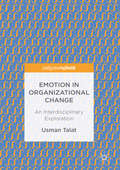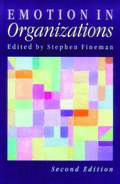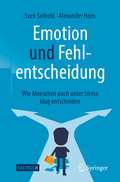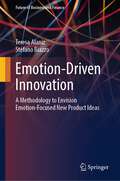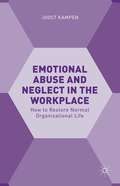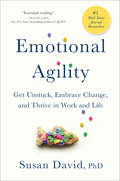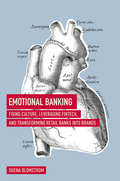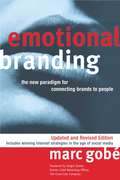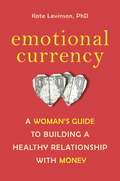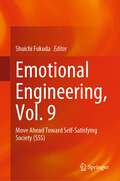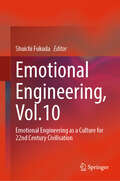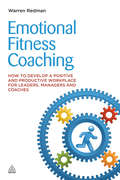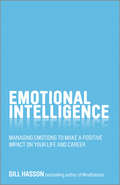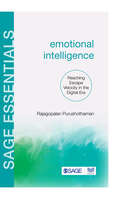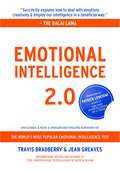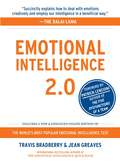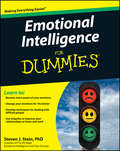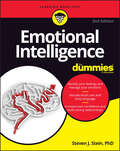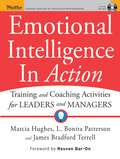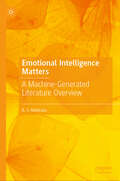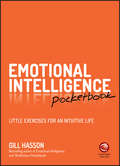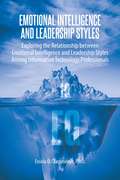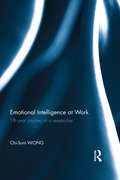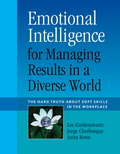- Table View
- List View
Emotion in Negotiations: An Introduction
by Colleen Kaftan Andrew WasynczukThis note reviews some of the relevant research and offers advice for managing and dealing with emotions in the negotiation context. In particular, negotiators should strive to understand their own emotions and feelings and be aware of the emotions the other party may be expressing. By learning to recognize and manage emotions, one is likely to improve many facets of the negotiation and obtain better outcomes for oneself and others.
Emotion in Organizational Change
by Usman TalatThis book constructs a multi-disciplinary interpretation of emotion, specifically applied and discussed within Organizational Change environments. Including a range of perspectives from Philosophy, Evolutionary Sciences, Psychology and Sociology, Emotion in Organizational Change also provides a historical picture of our knowledge of emotion. The author explores how this understanding can contribute towards a novel understanding of a pervasive phenomenon in society and its organizations.
Emotion in Organizations (Second Edition)
by Stephen FinemanThis Second Edition contains key themes with all new contributors and is a completely separate work from the first. Emotion in Organization presents original work from leading scholars in the field, they engage with emotion as a qualitative phenomenon which shapes and is shaped by organizational life. Examining how emotion cannot be simply separated from thinking, judgment, decision-making and other so-called rational organizational processes, the book challenges us to build a passionate theory of organizations. <p><p> The introduction reviews the expansion of organizational emotion studies and their appeal to several social-scientific disciplines. Divided into four parts, the book reveals through stories, interviews, confessions, ethnographies and observations the way feeling and emotion lie at the heart of organizational functioning.
Emotion und Fehlentscheidung: Wie Menschen auch unter Stress klug entscheiden
by Alexander Horn Sven SeiboldDieses Sachbuch zeigt Ihnen, welche Logik unseren Entscheidungen zugrunde liegt – und wie Fehlentscheidungen entstehen. Sie lesen zur Veranschaulichung spannende Beispiele aus Politik und Zeitgeschehen sowie aus dem Alltag. Die Ergebnisse und Schlüsse sind sowohl im Beruf wie im Privaten für Sie nutzbar. Allerdings: Es ist anstrengend, gute Entscheidungen zu treffen. Man muss dem inneren Schweinehund entgegentreten und sich zum Denken zwingen, selbst wenn man das nicht möchte und sich das vielleicht auch nicht zutraut. Kommen Sie mit auf eine Entdeckungsreise. Aus dem Inhalt: Situationen – was Entscheiden schwer macht * Emotionen – schlechter als ihr Ruf * Denken – ist anstrengend, hilft aber * Fakten, Wahrnehmungen und Hypothesen * Rekonstruktion – man muss eine Situation verstehen * Gut entscheiden – der rote Faden * Wenn es darauf ankommt – machen Sie es wie Petrow * Nachwort – Persönlichkeit, Führung und die Anderen. Über die Autoren: Sven Seibold ist Psychologe und Professor für Wirtschaftspsychologie; berät Unternehmen in Verdachtsfällen von Mobbing, Burn-out, Wirtschaftskriminalität und Wirtschaftsspionage. Alexander Horn ist Kriminalrat beim Polizeipräsidium München, Leiter der Operativen Fallanalyse Bayern, Experte für schwierige polizeiliche Ermittlungen. Beide haben intensiv zu Entscheidungsverhalten in Extremsituationen geforscht und fanden die Ergebnisse so alltagsrelevant, dass sie diese hier praxisnah darstellen.
Emotion-Driven Innovation: A Methodology to Envision Emotion-Focused New Product Ideas (Future of Business and Finance)
by Stefano Biazzo Teresa AlanizIt is now widely recognized that the emotional dimension of products and services is a critical success factor in many sectors. Generating products with significant emotional features is a complex challenge, as professionals responsible for designing and developing new products should be able to focus the design effort on eliciting specific emotions. But how do designers prepare themselves to convey emotions through the products they design? How do they know how to provoke certain emotions? To obtain the benefits that the knowledge of emotions can bring when it is integrated into the design process, professionals need to be assisted with approaches to apply the knowledge of emotions systematically and strategically. This book presents the development of a process to support product design teams to envision emotion-focused new product ideas - Emotion-Driven Innovation (E-DI). The E-DI process supports designers in identifying the occurrence of emotions in a certain category of products present in the market and applying this information to make strategic decisions when defining the emotional intentions for the new product. It also helps to focus their creative thinking to develop strong and meaningful emotion-centric new product ideas. This book targets a professional audience wanting to learn more about this process and provides useful tools and frameworks that can be applied in real-life cases.
Emotional Abuse and Neglect in the Workplace: How To Restore A Normal Organizational Life
by Joost KampenEmotional Abuse and Neglect in the Workplace tackles the big questions: How does emotional neglect of employees affect an organization? How can management effectively manage while restoring an organization’s health? When trust is gone, only reliable behavior by senior managers can help - and this takes time. The author explores striking similarities between the symptoms of ailing organizations and abusive or neglectful families. This book explores not only a new theory of neglected organizations, but also a set of methods enabling OD practitioners to restore employees’ trust. It also provides diagnostic tools and guidelines for change agents who confront organizational neglect head-on and includes case studies and real-life experiences of OD practitioners.
Emotional Agility: Get Unstuck, Embrace Change, and Thrive in Work and Life
by Susan DavidThe counterintuitive approach to achieving your true potential, heralded by the Harvard Business Review as a groundbreaking idea of the year. The path to personal and professional fulfillment is rarely straight. Ask anyone who has achieved his or her biggest goals or whose relationships thrive and you'll hear stories of many unexpected detours along the way. What separates those who master these challenges and those who get derailed? The answer is agility--emotional agility. Emotional agility is a revolutionary, science-based approach that allows us to navigate life's twists and turns with self-acceptance, clear-sightedness, and an open mind. Renowned psychologist Susan David developed this concept after studying emotions, happiness, and achievement for more than twenty years. She found that no matter how intelligent or creative people are, or what type of personality they have, it is how they navigate their inner world--their thoughts, feelings, and self-talk--that ultimately determines how successful they will become. The way we respond to these internal experiences drives our actions, careers, relationships, happiness, health--everything that matters in our lives. As humans, we are all prone to common hooks--things like self-doubt, shame, sadness, fear, or anger--that can too easily steer us in the wrong direction. Emotionally agile people are not immune to stresses and setbacks. The key difference is that they know how to adapt, aligning their actions with their values and making small but powerful changes that lead to a lifetime of growth. Emotional agility is not about ignoring difficult emotions and thoughts; it's about holding them loosely, facing them courageously and compassionately, and then moving past them to bring the best of yourself forward. Drawing on her deep research, decades of international consulting, and her own experience overcoming adversity after losing her father at a young age, David shows how anyone can thrive in an uncertain world by becoming more emotionally agile. To guide us, she shares four key concepts that allow us to acknowledge uncomfortable experiences while simultaneously detaching from them, thereby allowing us to embrace our core values and adjust our actions so they can move us where we truly want to go. Written with authority, wit, and empathy, Emotional Agility serves as a road map for real behavioral change--a new way of acting that will help you reach your full potential, whoever you are and whatever you face.From the Hardcover edition.
Emotional Banking: Fixing Culture, Leveraging Fintech, And Transforming Retail Banks Into Brands
by Duena BlomstromBanking is under threat. Despite access to fast-paced technology known as FinTech, an antiquated business model and internal organizational paralysis do not allow for the creation of a truly beloved brand and are stifling change. To survive and thrive when their competition is catching up, banks must understand the principles behind Emotional Banking—a cultural change concept that brings the consumer to the center of rethinking banking products and delivery. This book starts with a history of the space then moves into an overview of what FinTech is. After discussing the state of banking today including stories from the biggest names in the industry, the concept of Emotional Banking and Brand are introduced as an answer to the problems outlined above. It concludes with examples of best practices and a hands-on approach on how to change the inertia, become a brand and make customers fall in love with their bank. Some of the questions this book tackles include: · Why don’t banks “care”?· How many banks will survive?· What is FinTech and why does it matter?· Can Banks become beloved brands and find their way to the consumer’s heart?· Why is there a disconnect between what we say and what we do in the industry?· Is inertia in banking a result of broken internal culture?· Which big brand or challenger will be at the top in 5 years?
Emotional Branding: The New Paradigm for Connecting Brands to People
by Marc GobeEmotional Branding is the best selling revolutionary business book that has created a movement in branding circles by shifting the focus from products to people. The "10 Commandments of Emotional Branding" have become a new benchmark for marketing and creative professionals, emotional branding has become a coined term by many top industry experts to express the new dynamic that exists now between brands and people. The emergence of social media, consumer empowerment and interaction were all clearly predicted in this book 10 years ago around the new concept of a consumer democracy. In this updated edition, Marc Gobé covers how social media helped elect Barack Obama to the White House, how the idea behind Twitter is transforming our civilization, and why new generations are re-inventing business, commerce, and management as we know it by leveraging the power of the web. In studying the role of women as "shoppers in chief, "and defining the need to look at the marketplace by recognizing differences in origins, cultures, and choices, Emotional Branding foresaw the break up of mass media to more targeted and culturally sensitive modes of communications. As the first marketing book ever to study the role of the LGBTQ community as powerful influencers for many brands, Emotional Branding opened the door to a renewed sensitivity toward traditional research that privilege individuality and the power of the margins to be at the center of any marketing strategy. A whole segment in the book looks at the role of the senses in branding and design. The opportunity that exists in understanding how we feel about a brand determines how much we want to buy. By exploring the 5 senses, Emotional Branding shows how some brands have built up their businesses by engaging in a sensory interaction with their consumers. Emotional Branding explores how effective consumer interaction needs to be about senses and feelings, emotions and sentiments. Not unlike the Greek culture that used philosophy, poetry, music, and the art of discussion and debate to stimulate the imagination, the concept of emotional branding establishes the forum in which people can convene and push the limits of their creativity. Through poetry the Greeks invented mathematics, the basis of science, sculpture, and drama. Unless we focus on humanizing the branding process we will lose the powerful emotional connection people have with brands. Critics hailed Emotional Branding as a breakthrough and a fresh approach to building brands. Design in this book is considered a new media, the web a place where people will share information and communicate, architecture a part of the brand building process, and people as the most powerful element of any branding strategy. Most importantly, it emphasizes the need to transcend the traditional language of marketing--from one based on statistics and data to a visually compelling new form of communication that fosters creativity and innovation.
Emotional Currency: A Woman's Guide to Building a Healthy Relationship with Money
by Kate LevinsonEvery day, women face new challenges that come with having control over, and responsibility for, their financial lives. Sometimes exciting, sometimes frightening, these issues always have an emotional side. Author and psychotherapist Dr. Kate Levinson offers fresh approaches to navigating the astonishing range of beliefs about the role of money in our lives, coming to terms with our feelings about being "rich" or "poor," and exploring our inner money life so that we can put our feelings to work for us in a positive way. By understanding our intimate history and relationship with money we are better able to handle our money anxieties, solve our money problems, enjoy the money we have, and make room for other, more meaningful values.From the Trade Paperback edition.
Emotional Engineering, Vol. 9: Move Ahead Toward Self-Satisfying Society (SSS)
by Shuichi FukudaThis is the latest volume in the series of Springer titles on emotional engineering tracking the development of this field.Engineering has been based on the Euclidean space approach and it was numerical data-centric. In short, our engineering up to now has been control-based, i.e., on tactics and problem solving. When we realize AI consumes 10,000 times more energy than human brain, we understand how it is better to use 10,000 people’s minds. But current society is industrial society. The industrial revolution introduced division of labour and we started to work for others. But the tremendous consumption of energy indicates that we need to move toward another society. If we can make the next society a self-Satisfying society (SSS) and create a new sustainable society with greater mental wellbeing then many emerging problems will be solved and we can enjoy our lives better. Emotional engineering engages with this challenge.
Emotional Engineering, Vol.10: Emotional Engineering as a Culture for 22nd Century Civilisation
by Shuichi FukudaThis book is the latest volume in the series of Springer titles on emotional engineering, tracking the development of this field. In our society, "Culture" emerges at the dawn of each era, laying the foundation for the development of "Civilization," which is then passed on to the succeeding era. "Culture" embodies the timeless essence of human characteristics, transcending temporal and spatial boundaries, encompassing the visionary pursuit of the future and the relentless quest for self-realization. Both "Motivation" and "Emotion" stem from the Latin word Movere, denoting movement. Why do we, as living beings, bear the epithet "Creatures"? It is because we instigate movement to thrive. Unlike other animals, who move merely to subsist in the present, humans navigate life with an eye toward tomorrow. "Emotion” etymologically signifies "to move out" in Latin, implying the act of manifesting one's inner realm in the external world. However, as denoted by the term "VUCA" (Volatility, Uncertainty, Complexity, and Ambiguity, our society is rapidly evolving into a realm of increasing complexity and diversity, transitioning from the tangible to the intangible. While the tangible realm necessitates interaction, the evolving landscape calls for the intervention of technology. Technology delves into the realm of "How." Yet, "Culture" resides in the emotional domain, pondering "What" and "Why,", as does Engineering. The "Process" of daring to transform dreams into reality assumes paramount significance. History admonishes us that now is the opportune moment to forge a novel "Civilization" for the twenty-second century. Let us harness the power of Emotional Engineering to sculpt the twenty-second century "Civilization" into its best iteration. This book of collected chapters sums up this challenge and how we can meet it.
Emotional Fitness Coaching: How to Develop a Positive and Productive Workplace for Leaders, Managers and Coaches
by Warren RedmanEmotional Fitness Coaching is the practical approach to applying the principles of emotional intelligence to the workplace to create a healthy, positive and creative environment in every situation. Based on thirty years experience in the field, it offers a toolkit for people to be better managers, leaders and professionals while also feeling more at ease with the interpersonal skills vital to any business relationships. Using a storytelling approach it covers a range of techniques including Power Listening, Learning from Experience, the power of Group Dialogue, Creating Balance and Emotional Fitness Storytelling. Each tool is described and examples given of how each could be used in various work circumstances. Exercises throughout the text provide the opportunity for the reader to apply the tools directly to their own context.
Emotional Intelligence
by Gill HassonFrom the author of the bestselling Mindfulness: Be Mindful. Live in the Moment. With her bestselling book Mindfulness, Gill Hasson has helped thousands of people worldwide to be calm, collected and live in the moment. Now she is here to help us increase our Emotional Intelligence and become better communicators, more self-aware and in control of our moods and feelings.Emotional Intelligence is the ability to identify, assess and control the emotions of yourself and others. Raising your EQ will improve your performance, satisfaction and confidence. Some say a high EQ is more important to the quality of your life and your success than your IQ. It's all about having an astute ability to perceive emotions - so being able to detect and decipher emotions in people's faces, words, body language; the ability to harness your emotions and use them effectively for decision making, problem solving and more; and how to manage them - keeping emotions regulated in yourself and others.Emotional Intelligence will show you how to heighten your EQ and improve your home and work life. Includes:How to make clearer, more confident decisionsMotivate othersDeal with bullying at workManage pressure, stress and deadlinesImprove your ability to learn and studyManage jealousy and forgivenessGive advice and support to othersBe an emotionally intelligent parent and raise emotionally intelligent children
Emotional Intelligence (SAGE Essentials)
by Rajagopalan PurushothamanIn the digital world, the significance of emotional intelligence (EI) will gain further importance as technologies such as artificial intelligence (AI) and automation partly or fully replace human intervention. Humans will be valued by their unique characteristics and skills in the digital world. There is no doubt that EI is one of the differentiating future competencies in Industry 4.0. The book helps in understanding each component of EI along with its meaning, significance and application in our professional and personal lives. It talks about the five main elements of EI, namely self-awareness, self-regulation, self-motivation, empathy and social skills that allow us to escape from the ordinary. The necessary foundation for building EI is based on the three main components of mindfulness, resilience and compassion, which are also discussed in the book. It further provides steps for driving with EI and is filled with EI self-assessment tools and exercises. Emotional Intelligence shares the recipe for lifelong health, good relationships, professional and personal success, and happiness.
Emotional Intelligence 2.0
by Travis Bradberry Jean GreavesEmotional Intelligence 2.0 is a book with a single purpose -- increasing your EQ. Here's what people are saying about it: "Emotional Intelligence 2. 0 succinctly explains how to deal with emotions creatively and employ our intelligence in a beneficial way." - The Dalai Lama. "A fast read with compelling anecdotes and good context in which to understand and improve." - Newsweek. "Gives abundant, practical findings and insights with emphasis on how to develop EQ." - Stephen R. Covey. "This book can drastically change the way you think about success...read it twice." - Patrick Lencioni. In today's fast-paced world of competitive workplaces and turbulent economic conditions, each of us is searching for effective tools that can help us to manage, adapt, and strike out ahead of the pack. By now, emotional intelligence (EQ) needs little introduction's no secret that EQ is critical to your success. But knowing what EQ is and knowing how to use it to improve your life are two very different things. Emotional Intelligence 2.0 delivers a step-by-step program for increasing your EQ via four, core EQ skills that enable you to achieve your fullest potential: 1) Self-Awareness; 2) Self-Management; 3) Social Awareness; 4) Relationship Management.
Emotional Intelligence 2.0
by Patrick M. Lencioni Travis Bradberry Jean GreavesFOREWORD BY PATRICK LENCIONI, BESTSELLING AUTHOR OF THE FIVE DYSFUNCTIONS OF A TEAM.Emotional Intelligence 2.0 is a book with a single purpose-increasing your EQ. Here's what people are saying about it:"Emotional Intelligence 2.0 succinctly explains how to deal with emotions creatively and employ our intelligence in a beneficial way."-THE DALAI LAMA"A fast read with compelling anecdotes and good context in which to understand and improve."-NEWSWEEK"Gives abundant, practical findings and insights with emphasis on how to develop EQ."-STEPHEN R. COVEY"This book can drastically change the way you think about success...read it twice."-PATRICK LENCIONIIn today's fast-paced world of competitive workplaces and turbulent economic conditions, each of us is searching for effective tools that can help us to manage, adapt, and strike out ahead of the pack.By now, emotional intelligence (EQ) needs little introduction-it's no secret that EQ is critical to your success. But knowing what EQ is and knowing how to use it to improve your life are two very different things.Emotional Intelligence 2.0 delivers a step-by-step program for increasing your EQ via four, core EQ skills that enable you to achieve your fullest potential:1) Self-Awareness2) Self-Management3) Social Awareness4) Relationship Management
Emotional Intelligence For Dummies
by by Steven J. SteinBeing aware of and in control of your emotions is one of the keys to success in life -- both professionally and personally. Emotional Intelligence For Dummies will show you how to take control of your emotions rather than letting your emotions control you! Discover how developing your emotional intelligence can further your relationships with others, in the workplace and at home. Emotional awareness is also a critical skill for career success, and Dr. Stein provides practical exercises for developing this skill and achieving your professional and personal goals. He also provides valuable insights into how emotional intelligence can be applied to raising children and teenagers and realizing personal happiness. Full of lively anecdotes and practical advice, Emotional Intelligence For Dummies is the ideal book for anyone who wants to get smart about their feelings and reach the next level at work and at home. Manage your emotions - identify your feelings, determine what beliefs cause negative emotions, and stop self-destructive behaviors Discover the power of empathy - read other people's emotions through facial cues and body language and show them you understand their feelings Thrive at work - find a job that's right for you, overcome hassles and fears, and develop your leadership skills Build and sustain meaningful relationships - discover how to take your partner's emotional temperature and manage emotions to grow closer Raise an emotionally intelligent child - keep your cool with your child, coax shy children out of their shells, and get your child to be less aggressive and defiant
Emotional Intelligence For Dummies (In A Day For Dummies Ser. #77)
by Steven J. SteinGet smart about your feelings to achieve success and happiness Emotional intelligence (also known as emotional quotient or EQ) is all about perceiving, using, understanding, managing, and handling your emotions and those of others. Develop crucial emotional skills that will help you in your career and in your personal life with Emotional Intelligence For Dummies. Learn to manage your emotions, uncover the power of empathy, and build meaningful relationships. Raise emotionally intelligent kids, become a better leader at work, and land the job you want. Let Dummies be your guide to living your best life! Gain emotional awareness that you can use in the workplace and at home Engage in practical exercises to develop your emotional intelligence skills Apply emotional intelligence in parenting children and teenagers Reduce stress and realize greater personal happiness with a higher EQThis new edition incorporates the latest research on emotional intelligence, the new EQ-i 2.0® model, and updated exercises. Anyone who wants to get a grip on their emotions and seek success in life will benefit from this fun and practical guide.
Emotional Intelligence In Action
by James Bradford Terrell Marcia Hughes Reuven Bar-On L. Bonita PattersonEmotional Intelligence in Action shows how to tap the power of EI through forty-six exercises that can be used to build effective emotional skills and create real change. The workouts are designed to align with the four leading emotional intelligence measures--EQ-I or EQ-360, ECI 360, MSCEIT, and EQ Map, --or can be used independently or as part of a wider leadership and management development program. All of the book's forty-six exercises offer experiential learning scenarios that have been proven to enhance emotional intelligence competencies.
Emotional Intelligence Matters: A Machine-Generated Literature Overview
by R.S. MekhalaThis book is a Machine-Generated Literature Overview of personal EI development. The book is about the importance of developing emotional intelligence in workplace, especially in managing people in an organizational space. It talks about propelling productivity by inducing emotional intelligence. It discusses how stress can be managed with emotional intelligence. The impact of emotional intelligence in developing leadership skills. It explores the role the factor of emotional intelligence in HRM. It critically examines why is it very necessary for an employee to have this trait of EI and develop it eventually for a successful survival. It discusses the importance of EI in customer service and in day-to-day life.
Emotional Intelligence Pocketbook: Little Exercises for an Intuitive Life
by Gill HassonA practical "how-to" guide to changing the way you think about your emotions Bestselling personal development author Gill Hasson is back with this pocket sized guide to dealing with your emotions. Learn how to understand yourself and those around you with practical tips and tricks that will help you be more assertive, forge stronger relationships and manage anxiety. Did you know that the way you approach your own thoughts and feelings determines your happiness and success in every area of your life? Just think about it for a second, it's not necessarily the smartest people that are the most successful or the most fulfilled in life, being clever or highly skilled isn't enough. Your ability to manage your feelings, other people and your interactions with them are what makes all the difference. This highly practical book is full of advice, tips and techniques to help you: Understand and manage your emotions Become more assertive and confident Develop your social skills and your interactions with others Handle difficult situations, events and other people The Emotional Intelligence Pocketbook is your practical "how-to" guide for understanding yourself and those around you.
Emotional Intelligence and Leadership Styles: Exploring the Relationship between Emotional Intelligence and Leadership Styles Among Information Technology Professionals
by Eniola Olukayode OlagundoyeAll around the world, information technology is evolving at an alarming rate, and it could be challenging keeping up with the growing changes that we are witnessing with it. This paper explored the relationship between emotional intelligence and leadershi
Emotional Intelligence at Work: 18-year journey of a researcher
by Chi-Sum WongEmotional intelligence is a very popular concept since it was made known to the general public in 1995. However, it was under severe criticisms among scientific researchers and a lot of them did not believe that it should be accepted by scientists as true knowledge. The author of this book, who is one of the pioneers in this topic, spent sixteen years to study this concept. Together with other researchers, they gradually changed the conclusion of early researchers. Using rigorously scientific standards, this research team demonstrated that emotional intelligence is an intelligence dimension that has significant impact on various life outcomes such as life satisfaction and job performance. They developed testable theoretical framework for emotional intelligence in the workplace, and attempted to show that the trainability of emotional intelligence is larger than traditional intelligence concept. The book looks at, not only the scientific reports, but all the stories behind some of the rigorous scientific studies in the author's 18-year journey. Their choice of research designs and how the designs are suitable to provide scientific evidence to demonstrate the validity of emotional intelligence are also described. Through this book, the process of scientific enquiry and important issues concerning the emotional intelligence concept are revealed in details by vivid stories and rigorous scientific reports.
Emotional Intelligence for Managing Results in a Diverse World: The Hard Truth About Soft Skills in the Workplace
by Lee Gardenswartz Jorge Cherbosque Anita RoseWhether you work group stretches from here to Dubai or can easily meet in a conference room down the hall, anger and frustration are easy to come by when others don’t do things your way, follow directions, or respond the way you think they should. But when emotions manage workplace relationships, the result is conflict, disengagement, and low morale. Emotional Intelligence for Managing Results in a Diverse World delivers a novel prescription for managing effectively in today’s workplace: Use the dynamic principles of EQ plus insights from the author’s pioneering diversity work to increase your competence in managing emotions and enhance your effectiveness in work, relationships, and life. The book also gives you the know-how to use this approach in coaching and developing others to help them be more successful on the job.

